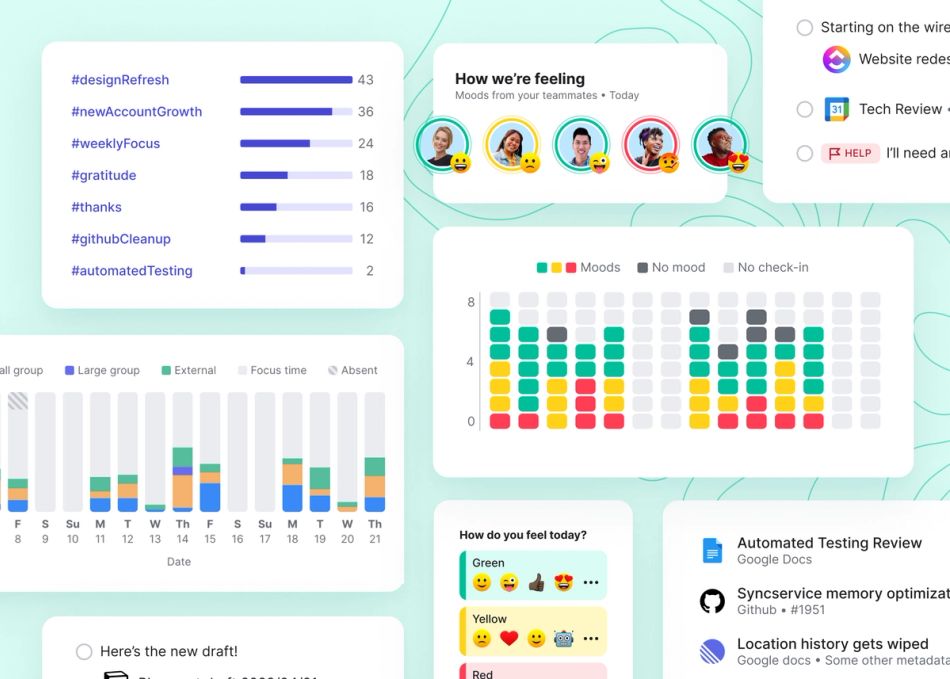
Amazing managers aren't born every day. Yes, there are people who naturally possess certain personality traits that help them thrive in leadership roles. However, becoming a great manager takes a combination of education, experience, passion, mentoring, and a drive to learn and grow.
An organization reaps significant benefits from cultivating and retaining their best managers, which is no easy feat. In fact, a recent Gallup study finds that companies fail at hiring the right manager 82% of the time.
Competition for high-performing leadership is fierce. Mix that in with the evolving management responsibilities, such as managing a remote workforce, and companies must stay on their toes — otherwise, competition can snatch their best managers out from under their noses.
There are many skills and talents great leaders employ to make them heavily sought-after. Below, we’ve identified 12 qualities that the best managers have, why they are important, and how to hone them.
1. Great communicator
No list of leadership qualities would be complete without written and verbal communication skills. According to a survey by The Economist, the consequences of poor communication skills can ripple throughout an organization, with 31% of respondents reporting that it resulted in low morale within their company, and 18% reporting lost sales.
A good communicator knows when to talk, but puts just as much of a priority on listening. They also appraise their audience and speak in a language that everyone can understand and digest. Concise, direct, and straightforward communication is most helpful. The best communicators are also approachable and willing to answer questions and expand on points that weren’t understood the first time.
Why communication is important
Sharing clear information, imparting expectations, and using language that the other person responds well to is essential to be a good communicator. Effective managers use communication to help team members stay focused, motivated, and understand the importance of the role they play within the team and the company overall.
Tips for improving your communication skills
It's easy to forget that communication is a two-way street. One of the best exercises to improve your communication skills is to practice active listening, which can help strengthen relationships — and is a great behavior to model for your team members.
2. Trustworthy
Trusting your manager is important to achieve positive business relationships. Trust strengthens the entire relationship. Findings show that there is a high correlation between trust and team performance, with an above-average impact on the team’s performance.
It provides a “safe space” for team members to share their thoughts and ideas, as well as their concerns and frustrations. A trusting environment fosters honesty and loyalty, which are two qualities that are priceless in high-performing teams.
Why is trustworthiness important
Being trustworthy allows team members to be comfortable sharing their ideas, goals, and expectations with their managers. If there is little or no trust, team members may not feel as comfortable being engaged and may become leery of communicating freely with their co-workers. Lack of trust can damage productivity and, over time, diminish a company’s positive culture.
Tips for improving trustworthiness
Managers can work on their trustworthiness by keeping confidences, not withholding important information, and relating to everyone honestly and transparently.
3. Emotionally intelligent
One of the most important qualities of a good manager is being able to manage your emotions and recognize emotions in others. This skill serves you well in business and in your personal life. A recent survey by Talent Smart EQ finds that 90% of top performing workers rank high in emotional intelligence.
Why emotional intelligence is important
Emotional intelligence, also referred to as emotional intelligence quotient (EQ), helps in decision-making and relating well to others. It's a soft skill that may have more influence on your ability to be a good manager than your intelligence quotient (IQ).
Tips for improving your emotional intelligence
Evaluate your responses to situations and determine how they relate to your emotions. Work on decreasing your emotional response in the future by keeping in mind how your reaction affects others. Remember, your goal should always be to de-escalate situations, not create more chaos.
4. Helpful coach and leader
One of the differences between a mediocre and an awesome leader is the ability to bring out the best in their people. Great leaders can see the potential in a person and are willing to put the work into bringing it out.
An effective leader helps their team members find and maximize their strengths and develop ways to handle their weaknesses.
Why coaching and leadership is important
One of the biggest reasons millennials decide to take a job is due to the mentoring opportunities the role offers. According to Deloitte’s 2022 Gen Z and Millennial Survey, learning and development opportunities are the second most popular reason these two populations choose to work for an organization, with work/life balance being the top reason. Coaching your team members increases employee engagement and empowers them to build new skills.
Tips for improving your coaching and leadership skills
Look for ways to encourage your team members to better themselves. Assign them to new projects, give them responsibility, and find them relevant training so they can do their best work.
5. Empowering and motivating
Encouraging others to take action is one of the key qualities of a good leader. The ability to create an environment where team members actively participate in reaching company goals is more important than the manager's individual actions.
A great manager will continuously champion their people and work toward getting them the training, assistance, and tools they need to be their most successful. They will also motivate them to reach their full potential.
Why this quality is important
Employees who feel valued, heard, and accepted are more likely to tackle their jobs passionately, and be happy with their companies longer. Their job satisfaction hinges on their manager's ability to motivate them and help them take ownership of their roles.
Tips for becoming more empowering and motivating
Avoid micromanagement and overseeing every detail of your team’s day. Give each team member responsibility for their own actions and encourage them to find ways to perform their jobs most effectively.
“The leaders who are viewed as the most helpful don’t try to preempt every problem or dive in as soon as they recognize one. Instead they watch and listen until they believe their subordinates see the need for help and are ready to listen receptively. They understand that people are more willing to welcome assistance when they’re already engaged in a task or a project and have experienced its challenges firsthand,” notes Colleen Fisher, an associate professor of organizations and innovation at University College London’s School of Management.
For example, if a team member always misses their deadlines, the manager could address this by offering time management tools to the person. They may also schedule check-ins to ensure the task is progressing and will be finished on time, or offer bonuses for work that’s finished early.
6. Goal-oriented
Many people put in hard work but make almost no progress. This happens because they haven't set clear, measurable goals to work toward.
Effective managers always keep goals in mind — not only to keep themselves on track, but to lead their teams in the most efficient way possible.
Why being goal-oriented is important
Working toward a goal is a great way to stay motivated. A goal-oriented company is a constructive working environment, because everyone is on the same page with a single mindset.
Tips to become more goal-oriented
Work on your time management skills and ability to focus. Think about what you want your team to accomplish, set a timeline, and talk to your team members about the specific goals each of them should handle. It's also helpful to understand SMART goal setting, which is a simple way to build effective goals on an individual or team level.
7. Knowledgeable
Team members want to believe their managers are experts. A knowledgeable manager is one of the best ways for team members to learn about company products and processes.
The best leaders have experience in the industry and competencies that help their team look up to them. Leaders who are less than knowledgeable may create confusion for their team. They may also fail to proactively guide and invest in their team the way they should.
It’s important for managers to set those expectations early for their teams, especially with software engineering teams–and to manage the environment, not just the people.
“How do people know what's most important as a team? How do they know how to help each other? And a lot of people don't understand that that is kind of a key part for engineering managers to focus on — improving that system to help sort of team flow. That's a trap that I see quite a lot, in that people see engineering management as, I manage the people on my team versus the environment in which they work,” says Pat Kua, founder of Tech Lead Academy.
Why industry knowledge is important
The team can bounce ideas off of knowledgeable managers and feel confident in the answers they get, as they can trust such a manager's judgment. Having access to a well-informed manager also provides team members with the opportunity to learn from someone with in-depth industry knowledge.
Tips for improving industry knowledge
Make it your job to be your company's knowledge base. Read material, attend relevant meetings and trainings to expand your expertise, and ask questions about products and processes you don't understand. Never stop learning.
8. Positive
A positive attitude is contagious, and it will make you a better manager. Approaching every project and challenge with passion and enthusiasm is contagious. Positive managers motivate their teams more easily, and keep their efficiency and morale high through rough times and busy periods.
Why positivity is important
Positivity helps team members ride out bad days, downturns, and negative situations with the faith that things will get better. A positive company culture keeps the company strong and motivated, reduces turnover, and can even make your company more attractive to prospective employees.
Tips for improving your positivity
Listen to what you say and head off any negative self-talk. Avoid focusing on the dark side of situations, and don't participate in gossip, rumors, or unnecessary griping.
9. Solves problems effectively
There will be problems. One of the most helpful leadership skills is the ability to look at a problem, weigh the options, and reach a well-informed decision about how to handle it.
Why problem-solving is important
Small problems can become big, damaging ones if they aren't addressed in a timely manner. Leaders who aren't good problem solvers, or new managers who don't feel confident in solving them, leave the company open to risk.
Tips for improving problem-solving
Take the time to digest the problem by making a list of potential solutions. Don’t be afraid to consult with other managers or team members, who may have helpful insights that you lack. Brainstorm ideas and choose the one that makes sense, but be sure to keep your emotions out of the decision.
10. Takes accountability
Playing the blame game is not the sign of a great manager. Acknowledging your own mistakes or shortcomings makes you appear human and shows that nobody is perfect — even managers.
Why accountability is important
When a good manager holds themselves accountable for making progress and achieving goals, it fosters an environment of accountability within your team and encourages team members to model your behavior.
Tips for improving accountability
Reflect on your responsibilities and understand your role. Don't overcommit or overpromise, as this proactively sets you up for failure. When it comes to taking the blame for a mistake, leave your ego out of it.
11. Offers opportunities for employee development
Team members will be more engaged if they get opportunities to hone their current skills and learn new ones. A great manager is pivotal in making this possible, identifying training and professional development opportunities and coordinating team member attendance.
Why employee development is important
Employee development opportunities help team members widen their career paths. A 2021 Gallup survey finds that young adults between 18 and 24 years old believe upskilling is the third most important aspect when evaluating job opportunities, only behind health insurance and disability benefits.
Tips for offering employee development
Listen to what your team members want and find ways to give it to them. Keep your eyes open for mentorships, conferences, and training you can offer them to develop their skill sets.
12. Readily available
An invisible manager is of little use to anyone. Being a present contributor to the daily workplace is essential if you want to be a great manager.
Why availability is important
In addition to setting a good example, being available and approachable shows your team they can count on you for feedback and guidance. This builds trust and strengthens morale.
Tips for improving your availability
Make yourself more available to your team members. Tell them to come to you and make time when they do. (Those active listening skills we mentioned earlier really come into play here!) You might even try designating specific “office hours” to help them know you're there for them, and keeping it casual to encourage participation.
Enhance your management skills and communication skills with Range

Being a good manager is a constant work in progress. Mediocre managers can become good, and good managers can become great by practicing self awareness, active listening, and keeping emotions out of decision-making.
Set a goal to strengthen yourself in a couple of these qualities over the next few months — you'll be surprised at what a difference your efforts can make!
But even great leaders need powerful async tools to assist them with project management, goal-setting, and accountability. Range helps teams build stronger working relationships, whether they’re remote or in-office.
As a manager with Range, you can:
- Reduce meeting load by keeping every team member informed and connected
- Easily share plans and what they’ve accomplished
- Check-in on a personal level and stay in-the-know








